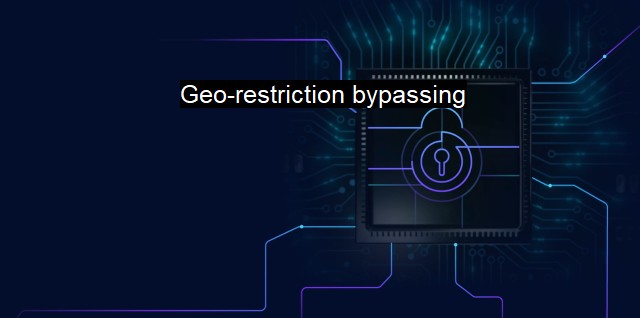What is Geo-restriction bypassing?
Gaining unobstructed internet access: Understanding Geo-Restriction Bypassing via VPN and Cybersecurity
Geo-restriction bypassing is a topic growing in relevance especially in the context of cybersecurity and antivirus measures. Simply put, geo-restriction bypassing refers to the methods of evading constraints set in place by web services that block access to their content based on the user's geographical location.When a user connects to the internet, their IP address, a unique identifier for every computer device, contains comprehensive pieces of information, including their approximate physical location—city, district, and sometimes even a specific area. Companies use this information to limit access to their services geographically, also known as geo-blocking. Reasons for restricting access to online content usually revolve around issues of licensing rights, government restrictions, varying product prices, and strategic business decisions. Therefore, for a myriad of reasons, some content on the internet may be inaccessible based on your geographical location, calling for the need for geo-restriction bypassing.
The act of geo-restriction bypassing refers to ways of disguising or altering a user's IP address to access restricted content, circumventing geographical constraints. For instance, if a video streaming service only allows its content to be viewed in the United States, a bypass would involve making it appear as if the IP address is based within the US—even though it actually isn’t; thus making the restricted content accessible.
There are different approaches to bypassing geo-restrictions, but the most common ones involve the use of virtual private networks (VPN), proxy servers, and the Tor network.
VPNs are becoming increasingly popular tools for this purpose. Not only do they offer privacy benefits by encrypting all data traffic sent and received by a user’s device, but they also mask the user’s actual IP address. By using a VPN, one can remotely connect to a server located in a different country, effectively bypassing geographical restrictions. Irrespective of the user's actual location, the VPN server’s IP address and location are what is visible to the web services.
Proxy servers function in a similar way as VPNs but without the added layer of encryption. They act as intermediaries between the user and the website being accessed, forwarding the user's web requests. A proxy server's main benefits are masking the user's IP address and providing access to geo-restricted content.
Then there is the Tor network, a system that functions by directing network traffic through a succession of servers worldwide. As with VPNs and Proxies, this gives your IP address the appearance of being in a location different than your actual one, thereby bypassing geo-restrictions.
While geo-restriction bypassing can improve internet freedom and accessibility, it poses considerable implications in cybersecurity. Questionable avenues like shady third-party VPNs or proxies are often honeypots for cybercriminals, posing risks to users' online security. Without adequate antivirus measures, these methods can potentially compromise important personal data stored on devices and networks.
Antivirus software plays an essential role in ensuring the security of these systems and methods use to bypass geo-restrictions. It helps in defending systems against malware or malicious activities that may exploit these network connections. As the user leverages these services to access various websites, antivirus software plays a vital role in protecting against threats that might arise from unidentified sources or compromised protocols.
To sum up, geo-restriction bypassing is a powerful tool for Internet users, enabling accessibility beyond geographical limits. its use must be complemented by reliable cybersecurity and antivirus measures to keep risks at bay and ensure data remains safe, uncorrupted, and secure at all times.

Geo-restriction bypassing FAQs
What is geo-restriction bypassing in the context of cybersecurity and antivirus?
Geo-restriction bypassing involves using technology to access content or websites that are restricted by location. In cybersecurity and antivirus, this may be done to bypass geo-restricted websites that may contain malware or other malicious content.Is geo-restriction bypassing legal?
The legality of geo-restriction bypassing can vary depending on the country and the reason for bypassing the restrictions. In some cases, it may be legal to bypass geo-restrictions for security or privacy reasons, while in other cases, it may be considered a violation of the terms of service of the website or application being accessed.What are some common methods of geo-restriction bypassing?
VPN (Virtual Private Network) and Proxy Servers are two of the most common methods of bypassing geo-restrictions. VPNs encrypt your internet connection and route it through servers in other locations, while Proxies act as an intermediary between your computer and the website you're trying to access, making it appear as though you're located in a different location. Other methods may include using DNS (Domain Name System) spoofing or changing your IP (Internet Protocol) address.What are some potential risks associated with using geo-restriction bypassing methods?
Using geo-restriction bypassing methods such as VPNs or proxies can potentially expose your data to security risks, especially if the service you're using is not trustworthy. Some free VPN and proxy services may also contain malware or sell your data to third-party advertisers. Additionally, using these methods to access geo-restricted content that may contain malware or other malicious content can put your device at risk of infection.| | A | | | B | | | C | | | D | | | E | | | F | | | G | | | H | | | I | | | J | | | K | | | L | | | M | |
| | N | | | O | | | P | | | Q | | | R | | | S | | | T | | | U | | | V | | | W | | | X | | | Y | | | Z | |
| | 1 | | | 2 | | | 3 | | | 4 | | | 7 | | | 8 | | |||||||